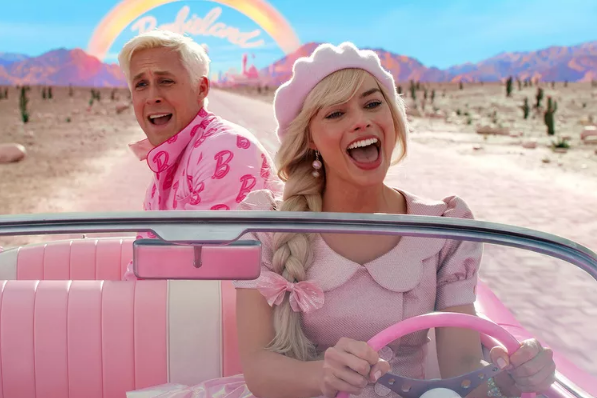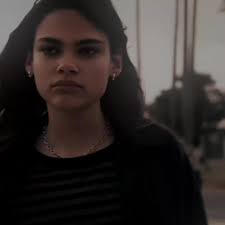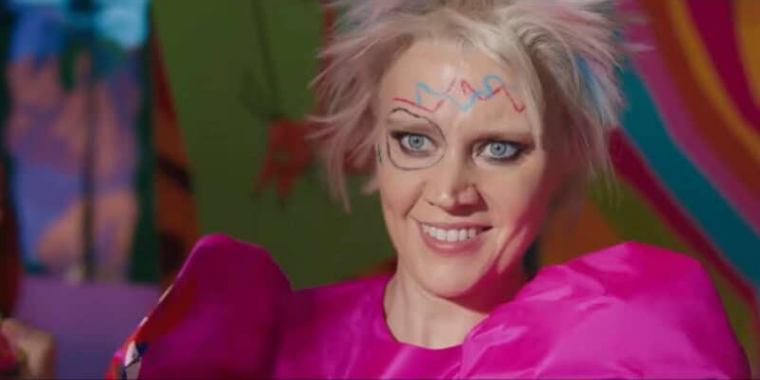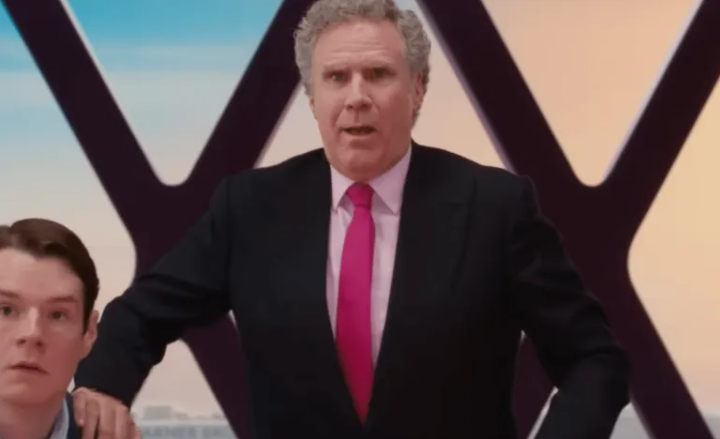(Greta Gerwig, 2023, USA, 114 minutes)
Part One: Well, How Did We Get Here?
Part Two: Barbie (The Toy) and Me
Greta Gerwig has been trying to sell out, as it were, for over a decade now. That isn't intended as a critique, though it could certainly be taken that way; it's just that, in recent interviews, she's made it clear that the $145-million Barbie doesn't represent a sudden swerve away from her independent film career, but rather the end goal she's sought all along. Considering the trajectory of her career since 2006, when she made her feature film debut in Joe Swanberg's LOL, this makes perfect sense.
In 2011, after appearing in 14 more, modestly-budgeted films--some strung together with barely any budget at all--she appeared in her first big studio picture, 2011's highly unnecessary remake of 1981's original Arthur.
Gerwig wasn't cast as a lead, but she had a significant role. As the headline to Eric Kohn's Indiewire review put it, "Greta Gerwig Is a Mumblecore Prop in Arthur." Her participation was the post-millennial equivalent of Parker Posey bringing her screwball charm to Nora Ephron's 1998 You've Got Mail, which was also a remake of a kind (an interpolation of 1940's The Shop Around the Corner). Unfortunately, this Arthur was a charmless affair.
The original Arthur wasn't about the script so much as the power trio of Dudley Moore, Liza Minnelli, and Sir John Gielgud striking sparks off each other. They were not replaceable, and definitely not by Russell Brand, Helen Mirren, and Jennifer Garner--one of whom has since become a notorious conspiracy theorist (Mirren, incidentally, serves as Barbie's narrator).
It isn't Gerwig's fault Arthur was a flop--any more than she's to blame for Brand's anti-vax views--and it probably provided her with some valuable insights into the world of the big studio production.
From the start, the Barnard graduate has proven herself a keen student of the movie-making machinery, so I would be surprised if she completely regrets her participation in Arthur, not least when it may have taught her what not to do.
As Kohn concludes in his not-completely-critical review, "Gerwig is now readily marketable." It's also fortunate for her that most people don't remember the movie--if they knew about it at all.
If Arthur had been a success, however, it may have hastened the way to projects on a larger scale. As it is, the scale of the projects did increase, but more gradually. The next year, 2012, she worked with both Woody Allen and Noah Baumbach, who would become her personal and professional partner (he cowrote Barbie; she cowrote Frances Ha and Mistress America).
I wouldn't call her participation in their films sellout moves by any means. That moment would arrive in 2014.
That year, she was cast as the lead in the CBS spin-off of How I Met Your Mother: How I Met Your Dad. Twitter exploded in condemnation, but the clamor was quickly shut down by supporters insisting it was her life, her career--she should do whatever she wants with it. Also, was it really so bad? Well, it could have been worse, but to judge by the trailer and the excerpts from the pilot--all available on YouTube--the sitcom probably wouldn't have lasted too long. We'll never know for sure, because CBS didn't exercise the option to bring it to series.
We'll also never know if the success of a network series--a considerable drain on a lead actor's time and energy--would have allowed her to do all of the acclaimed work she did afterward, but it seems likely that the trajectory would have crawled to a slower, less steady pace. Instead, she segued from acting and co-writing to writing and directing, as a solo act, two Oscar-nominated films, Lady Bird--which plays like a prequel to Baumbach's Frances Ha--and the lovely Louisa May Alcott adaptation Little Women.
That brings us to Barbie, Gerwig's ultimate sellout move. More charitably, it's the kind of big budget production she's long dreamed of making. I believe both things to be true, and unlike her other attempts, this one can't fail. Mattel Films and Warner Brothers have successfully stoked the fires with their scorched earth campaign--including over 100 brand partnerships. At this point, it really doesn't matter whether critics embrace it or not.
I played with Barbie when I was a kid. My mom was a feminist, and yet I don't recall any discomfort on her part. I think she knew I wasn't about to look to a 11.5-inch molded plastic figure as a role model, but rather a living, breathing woman--like her. In Barbie, Gloria (an excellent America Ferrera) represents that sort of person: a normal-looking woman with a husband, a daughter, and a nice, if non-dreamy house. She also works at Mattel.
Gloria sets the plot in motion when nostalgia spurs her to excavate the Barbie doll (played by a perfectly cast Margot Robbie in the movie's alternate reality) she told her preteen daughter, Sasha (former Disney Channel star Ariana Greenblatt), she had discarded. In private, she sketches versions of Barbie meant to reflect feelings about her humdrum life and the chasm growing between her and her sarcastic, black-clad daughter: Depression Barbie, Thoughts of Impending Death Barbie--that sort of thing.
In Barbieland, beautiful, flawless Barbie wakes up one morning to find that human frailty has found her, except she isn't human. Or is she? Gloria's actions have caused the real world to come crashing into the fake Mattel version where everything is pink and shiny and happy. Until it isn't.
As a kid, my life wasn't perfect, but it wasn't bad. We weren't middle-class, we were low income, but I always had a roof over my head, clothes on my back, food to eat, and toys--Barbie among them. I'm pretty sure I never had more than one at a time. No Ken, no Skipper; just Barbie.
In the months leading up to Barbie's release, I've read dozens of articles about the making and marketing of the movie, the history of the doll (much of which Gerwig depicts), and the launch of Mattel Films, an IP juggernaut designed to bring all of their best known properties to big-screen life, from Barney to Polly Pocket to Magic 8 Ball--the latter as a horror comedy.
Not one of these pieces mentioned Barbie in relation to income, and yet Barbie costs money. Even as a kid, I could tell the difference between an authentic one and a knockoff, but that's all some parents could afford.
I may have had the real thing, but I didn't have the Dreamhouse or the hot pink boxes of perfectly coordinated outfits. Instead, I built Barbie a world out of anything I could find. Just as my crafty mom was handy with a sewing machine or a set of knitting needles, I was handy with glue, tape, cardboard, and needle and thread. In a way, you could say that Barbie--as much as necessity--taught me the value of creativity and resourcefulness.
Much like the movie's Sasha, though, I eventually lost interest. I don't remember how or when, but other things took precedence and I forgot all about Barbie. This went on for years until 1998 when Mattel, in conjunction with Paramount Pictures, came out with a "Special Edition Holly Golightly in Breakfast at Tiffany's" Barbie, part of the Audrey Hepburn Collection--notably, the box doesn't say "Barbie" anywhere on it. This beautifully-designed doll came with sunglasses, a rhinestone tiara, long black gloves (which my cat nibbled on), a white stole--even a cup of (fake) coffee.
That same year, I bought the "Far Out Barbie," part of the Twist 'n' Turn or TNT Collection, a revival of a mod 1960s line. I won't deny that a big part of the appeal was her resemblance to Catherine Deneuve in The Umbrellas of Cherbourg, right down to her candy-colored shift dress, straight blonde hair, and pink hair ribbon. In interviews, Gerwig has specifically cited Jacques Demy's 1964 musical as an inspiration on Barbie.
For a brief moment in time, I was back in the Barbie biz, spurred by the fact that I was working at a certain online retailer that had just launched a toy store. I lost interest again until 2008 when Mattel released the pièce de résistance of collector's editions: the "Alfred Hitchcock's The Birds" Barbie, part of the Black Label Collection.
Though Tippi Hedren's name is regrettably absent from the front of the box, this is another beautifully-designed doll.
Hedren's character, Melanie, wears a snazzy mint ensemble, stylish camel heels, a smart brown handbag--and she's being pecked at by crows. One has even loosened a piece of blonde hair from her upswept hairdo, just as in the 1963 psychological thriller, in which a pretty woman with a dark past sets a small town--and its corvus--aflame. Alas, the doll sold out quickly, I didn't act fast enough, and that was the end of that.
The Birds doll was as subversive as Barbie would get. Unless you count Earring Magic Ken.
Barbie, the movie, is essentially a long-form commercial. Despite my history with Gerwig and with Barbie, I attended the preview screening more out of curiosity than anticipation due to the relentless marketing, the unfunny trailer ("I'll beach you off any day!"), and the fear that, like most corporate products, it means to be all things to all people. My fears were not unjustified, and not every joke lands, but many do. I laughed. Often.
Michael Cera as Ken's forgotten friend, Allan, is particularly amusing in a rather poignant way. Unlike so-called Weird Barbie (Kate McKinnon in fine form), he fits right in, and therein lies his problem, but not ours (we're just observers).
Mattel created Allan to serve as Ken's companion. He has no special skills, he's unexceptional-looking--though I find him cuter than male-model Ken (played by a very buff, very game Ryan Gosling)--he's so unremarkable he's practically invisible, and everyone ignores him. Gerwig depicts the phenomenon in a humorous way, but it's a real problem for real people. There are kids--and adults--who feel exactly the same way, and Allan speaks for them in a way that Barbie, Ken, and all the other perfect Barbies don't.
Between Gloria, Allan, Weird Barbie, and even Robbie's Stereotypical Barbie, the film's designated Pinocchio--she just wants to be a real woman--Gerwig has injected this corporate product with genuine feeling, but no matter how often she references Demy and Jacques Tati in interviews--and she's nothing if not film literate--Barbie is still a commercial. And here's where I break from the pack. Not so much in my opinion of the movie, but in my opinion of commercials: they get a bad rap. Sure, many are uninspired, but not all. In fact, many used to run on inspiration, and every year at their Oscars equivalent, the Clio Awards, the most inspired receive recognition.
With the rise of streaming, anti-commercial animus has grown stronger than ever. It's also easier to skip commercials, so Madison Ave has grown sneakier and more aggressive. It's a bummer, and I'm not thrilled about it either, but when I was young, commercials weren't just more readily accepted--or at least tolerated--they were part of the currency. We'd quote them ("Hey Mikey, he likes it!"), sing the catchiest jingles, laugh at the goofiest stuff, weep over the neglected dogs and cats--you name it.
Plenty of major directors have made commercials over the years, and not just to gain experience, but to make some coin between their more personal projects. That doesn't mean they didn't bring their A game. Ridley Scott's 1984-inspired Super Bowl ad for the Apple Macintosh computer is still considered a model of the form. David Lynch, Spike Lee, Wes Anderson, and many others have made commercials or PSAs in their own unique style.
But there's a difference between making short-form commercials and long-form theatrical releases backed by toy companies that feature dozens of their dolls, including several that wouldn't exist without the movie, like "Barbie the Movie Margot Robbie as Barbie In Pink Gingham Dress" and "Barbie the Movie Ken Doll Wearing Pastel Striped Beach Matching Set."
In Alex Barasch's illuminating and troubling New Yorker piece about the launch of Mattel Films, "After 'Barbie,' Mattel Is Raiding Its Entire Toybox," a company spokeswoman swears the movie isn't about selling toys. Bullshit. It's obviously about selling toys and ancillary products. I'm less concerned about a company finding an entertaining, people-pleasing way to sell their products than the sheer gall to deny that that's a motivating factor.
Ultimately, it's the disingenuousness of the movie's makers and funders that bums me out almost as much as the fact that the last thing today's troubled film culture needs is another MCU monopolizing all of the screens at the multiplex--and even art house theaters--and because audiences are being trained only to want more of what they already have, though I realize it's unreasonable to expect Gerwig or Robbie, who produced the movie, to speak in those terms.
I approached Barbie as the commercial that it is, and on that level, I enjoyed it. At times, I was even moved. Millions of other viewers will enjoy it for everything it appears to be on the surface, much as Dorothy harbors idealistic ideas about the Wizard of Oz--another one of Barbie's classic film references--until she realizes it's all a mirage. Oz isn't as great or as powerful as he appears. Like Will Ferrell's Mattel honcho in the movie, he's just the cowardly man behind the curtain. Dorothy, a mere slip of a farm girl, is the one who's brave and strong and true--a feminist hero for the ages (kind of bizarre that, in the Arthur remake, Gerwig plays a version of the role that originally went to Judy Garland's daughter, Liza Minnelli).
I'm not the first person to make this observation, and I won't be the last, but subversion isn't the same as self-awareness. Barbie is one, but it isn't the other. Gerwig and co-writer Baumbach poke gentle fun at Mattel, but by her own admission, they had to run everything by the studio brass. There were a few disagreements along the way--the studio wasn't fond of the term Stereotypical Barbie--but in the end, they worked everything out. I appreciate the way the couple pokes the bear, but I wouldn't say they drew blood, and nor would I have expected them to get away with it if they tried.
Why indeed. I think it was former New York Times film critic Janet Maslin--though I can no longer find the tweet--who questioned why men aren't subject to as much criticism as Greta Gerwig when they segue from independent features to big studio productions. It's largely true, except few men have had a career that looks anything like hers.
For one thing, she started out as an actress, though she was writing for the screen as early as Joe Swanberg's 2007 Hannah Takes the Stairs and directing as early as 2008's Nights and Weekends, a Swanberg co-directorial effort. Fifteen years elapsed between the $15K budget Nights and Barbie.
It's partly due to sexism, no doubt, but it's not that simple. Gareth Edwards made one independent, 2010's Monsters, before he was handed the reins to 2014's Godzilla, while Colin Trevorrow also made one independent, 2012's Safety Not Guaranteed (starring former Gerwig associate Mark Duplass), before he was handed the reins to 2015's Jurassic World. Both worked on Star Wars features, too. It just doesn't happen that fast for women.
By my count, Gerwig appeared in 26 feature films (not counting voice work) prior to Barbie. Consequently, she came to be seen as an Indie Queen. Edwards, Trevorrow, and the like--usually white and male--didn't spend as much time in the indie trenches, so it's less likely anyone sees them as sellouts. Opportunists, maybe, but that isn't the same thing.
With Gerwig, there was always the sense that independent cinema meant a great deal to her, and so fans have felt disappointed by what seems like an about-face, even if it really isn't.
Gerwig worked hard, she paid her dues, she repeatedly tried to sell out, and she kept trying until she succeeded.
In a way, she's a feminist hero for the ages, too. The system may be rigged against women, but what didn't work for Oscar-winning Nomadland director Chloé Zhao, who always seemed like a poor fit for the MCU, has paid off for Gerwig, who has come to seem like the best possible writer, director, and spokesperson for Barbie, and I believe that she was. For good and for ill.
Barbie opens nationwide on Friday, July 21.
Images from Warner Bros (Margot Robbie and Ryan Gosling), Barry Wetcher / Warner Bros (Greta Gerwig and Russell Brand), Wilson Webb / Indiewire (Gerwig on the Little Women set with Saoirse Ronan), Alberto E. Rodriguez / Getty Images / Warner Bros (America Ferrera), TikTok (Ariana Greenblatt), Digital Spy / Warner Bros (Michael Cera), Inside the Magic / Warner Bros (Kate McKinnon), Mattel (Gingham Barbie), mxdwn Movies (Will Ferrell and Connor Swindells), and the IMDb (Gerwig and Mark Duplass).










No comments:
Post a Comment